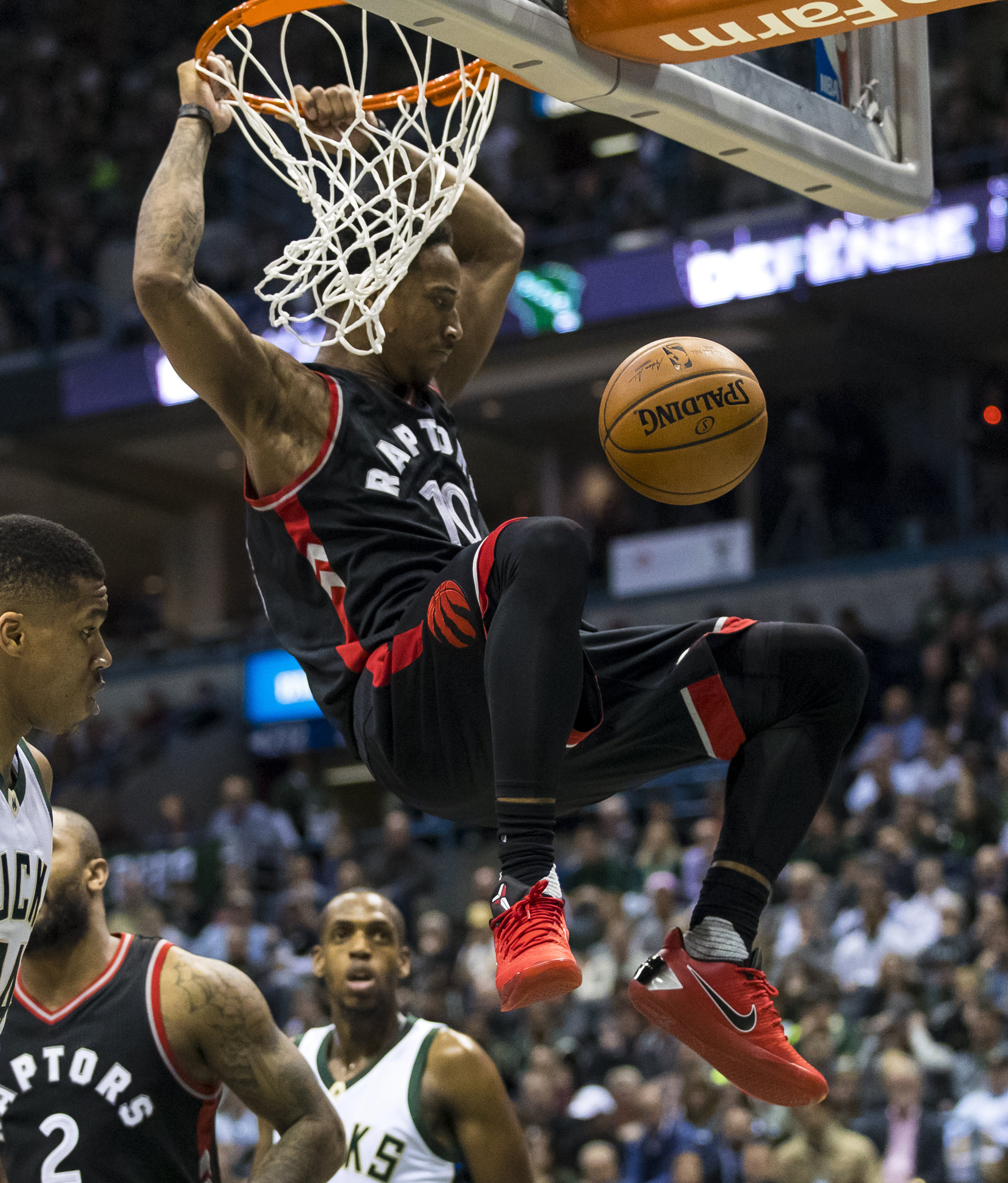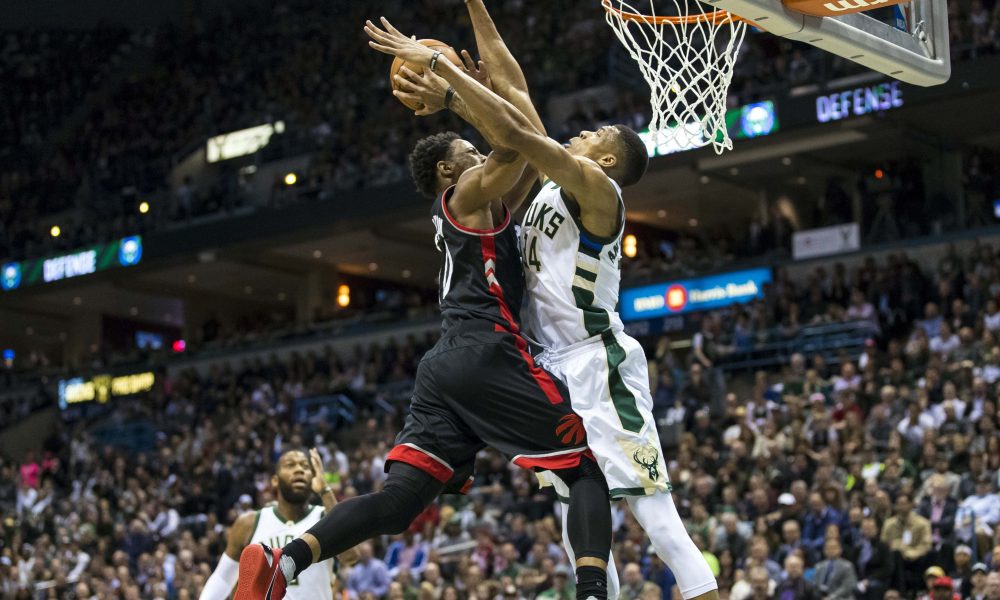Raptors 92, Bucks 89 | Box Score | Quick Reaction | Post-game news & notes | Reaction Podcast
It was supposed to be so easy.
Okay, not easy. Hard things are hard, and all of that. But over the course of Games 4 and 5, the Toronto Raptors had found a comfort level with the formula necessary to beat the Milwaukee Bucks. A heated film session following Game 3 helped tighten up some of the graver defensive concerns, and a renewed focus on ball movement in response to Milwaukee’s aggressive and unflinching traps opened up a bevy of quality looks at the other end. The starting lineup change, aimed at getting faster and more versatile guarding Giannis Antetokounmpo and Khris Middleton, worked well. On top of everything else, the Raptors could lean on the lessons of a pair of Game 6 mistakes a year ago and a pair of ugly outings earlier in this series.
The Raptors knew what was at stake, they knew what they needed to do at both ends, and, short of Jason Kidd making a dramatic change he never seemed that liable to make, their rotations were figured out.
Well, a grand don’t come for free.
As Game 6 tipped off, the Raptors promptly got themselves into an 8-2 hole, a deficit made more troubling by Serge Ibaka’s early foul trouble. Given the frequency with which the Raptors start games slow, this wasn’t all that concerning. Ibaka’s removal actually seemed to spark the team some, perhaps providing a wake-up call that shouldn’t have been necessary out of the gate in a game with stakes like these.
Whatever the case, Toronto found their groove from there, outscoring the Bucks 69-38 over the course of the next two-and-a-half quarters. That chunk of the same looked remarkably similar to Game 5, only with a greater air of…not invincibility, but of sustainability, maybe. Because the Raptors had played and won like this for an extended period, once the shock of sustained success wore off for shell-shocked Raptor fans – Tas Melas of The Starters points out that the Raptors playing 10 consecutive good quarters is a post-season record, one my research suggests tops the old record by about nine quarters – this all seemed quite doable. The ball wasn’t zipping quite like in the last meeting, but the 3-point shots were coming steadily and falling at a good clip, the Raptors were protecting the ball well, and all nine players who saw the floor were contributing in meaningful ways – outside of DeMar DeRozan (22 points) and Cory Joseph (zero), everyone had scored between four and eight points when the Raptors’ lead reached a 25-point crescendo mid-way through the third quarter.
To be honest, it’s on everyone for not seeing what was coming next.
Cruising along with eyes firmly on the Cleveland exit up ahead, the Raptors dropped their cell phone. In reaching down to find it beneath their seat, their foot slipped off the gas, pressed on the brake, and then the jerk of the car forced the foot to slide back onto the gas, the Raptors to bump their head on the steering wheel, and the whole thing very narrowly miss receiving a ticket for distracted driving or, worse, getting in an accident that would have resulted in a Game 7. That is a very, very clunky way of saying that things went awry. (Personal note: I’m writing this at 4 a.m. after a re-watch, since I originally caught the game from Hershey Centre, so please forgive the copy and the bad metaphors and The Streets references.)
When Kidd called a timeout, it was unclear exactly what he may be looking to adjust. He had already tried John Henson as an option, hadn’t found success with Mirza Teletovic or Jason Terry earlier in the series, and for whatever reason, Michael Beasley was back on the outside of the rotation. The Bucks are thin, it was clear that Antetokounmpo was going to play damn near every minute, and after Kidd only hesitantly tried Antetokounmpo as a center in the first half, it appeared motivation might be his only remaining ploy.
That did the trick. Coming out of that break, the Bucks were flying everywhere, getting arms into lanes and hands onto balls, chasing the Raptors off of the 3-point line, and generally making life uncomfortable for the favorites. The 17-4 run the Raptors had gone on to force the timeout quickly became a distant memory, with the Bucks closing the quarter on a 15-3 run of their own. Were it another team in another situation, a 13-point lead entering the fourth quarter in a close-out game would still feel pretty comfortable. Given the Raptors’ penchant for letting bad stretches snowball, the collective dread among the fan base was palpable, even through online or mobile channels.
Apparently, that was the case on the Raptors’ bench, too. Normally, the start of the fourth quarter is the time the Raptors make runs, but a Kyle Lowry-and-bench unit that’s looked good on paper let the slide continue. Dwane Casey pulled the plug quickly and brought DeRozan back into the game after a short break, but that failed to stop the bleeding. Another tweak, and even P.J. Tucker’s individual efforts on defense couldn’t settle things down. The Bucks railed off another 14-0 run, making it a 34-7 run overall, and the Raptors were suddenly, inexplicably down a bucket.
Here, it was time for Casey’s big timeout. Down 80-78 with 3:06 to go, the Raptors took a collective deep breath and tried to calm themselves. They were keenly aware of what the next 186 seconds meant, for their psyche, for the Bucks’ momentum, for a potential Game 7, and for their chances at taking a bite out of the Cavaliers in a few days’ time, should they get there. All series, the Raptors have talked up their experiences in the postseason, shared or individual, and how at some point, those should prove valuable. If ever there were a time for that experience to manifest, this was it.
“It was moreso just the players talking trying to calm ourselves down,” Patrick Patterson explained. “Just saying stay one possession at a time, focus on getting the stop, focus on moving the ball on offence and finding a great shot, finding a great opportunity and no hesitation.”
It’s cliche, but the ability to slow things down to one play, or one piece of a play, at a time was valuable.
“Once it got to the last couple minutes of the game, we understood: Now we’ve got to execute on both ends,” DeRozan said. “We’ve just got to get one stop. Rebound the ball. Go down offensively, be calm, be patient, not force anything, and get a basket. Possessions where Pat scored, Cory scored, that was big for us, and that was the time of the game where we really buckled down and understood: It’s winning time.”
It’s a damn good thing for DeRozan. Out of the breather, DeRozan took over, attacking for an impossible layup and following it with a thunderous dunk a few moments later. In between, Patterson threw down a dunk and Cory Joseph got onto the scoresheet with a massive corner three, helping the Raptors to an 11-2 run to take back a seven-point lead. Ibaka would then foul out, and after DeRozan missed a look in close and Terry hit a clean three, the collapse was in full redux, particularly so once DeRozan only split a pair at the line.
That gave the Bucks a chance to tie with 14 seconds to go, but without a timeout, Antetokounmpo had no time to plan out his attack. The Raptors seemed willing to let him shoot a three if he wanted to go for a tie, and after stringing out his dribble for far too long, Antetokounmpo instead opted to drive. Toronto was under clear instruction (by Casey or by instinct) to concede such a late drive since Milwaukee was without a timeout and the fouling game was a long-shot play, and so Antetokounmpo cruised in for a dunk, effectively sealing the Raptors’ victory. DeRozan hit a pair of free throws to ice the game, Patterson secured the ball after, and a hard bounce on the floor ate the clock after giving a brief flashback to Michael Ruffin.
The Raptors survived. It wasn’t pretty, but they got through it. It should have been easier, but hard things are hard, and now they’ll try to learn from this once again and apply the lessons moving forward. That includes a big one they shouldn’t need to keep learning: Move the ball. The Raptors managed just 14 assists, five secondary assists, and three free-throw assists in this game, one game after passing the ball much, much better. Milwaukee deserves some credit in that, but Toronto can be better.
“Moving the ball got us the lead. Not moving the ball got us in a slump. Moving the ball at the end got us a win,” Tucker said.
You’ve surely heard this before. Given how nerve-racking the series was – Toronto won by just four points over the six games – it might be best to just take the win, take a deep breath, and move on.
“Just ready for the next one,” DeRozan said.
At least it didn’t require a Game 7, right?



